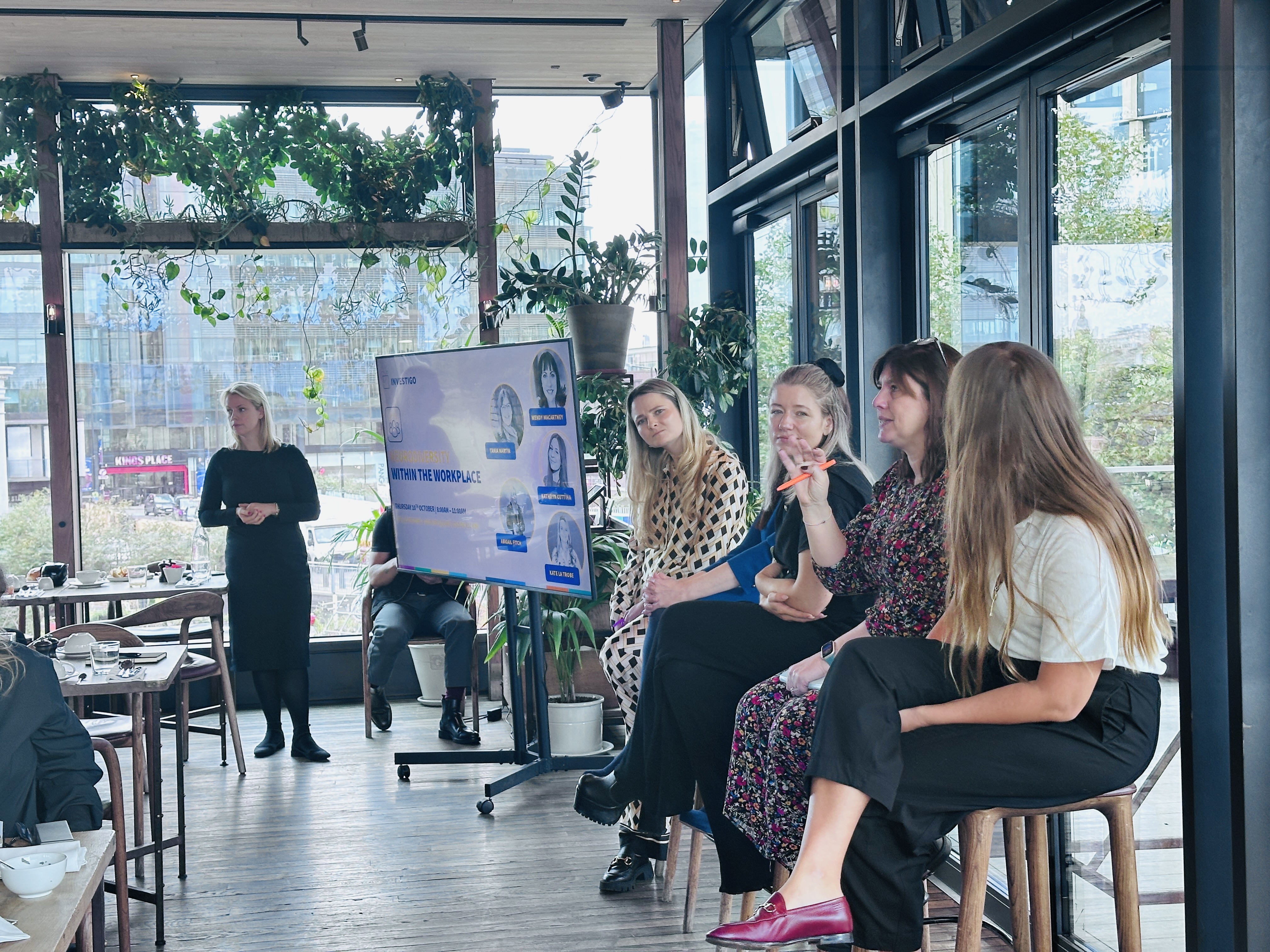
Event Recap: Neurodiversity In The Workplace
Last week, Investigo hosted a thought-provoking event focused on Neurodiversity in the Workplace, drawing together HR and Talent Acquisition (TA) leaders to explore the importance of creating inclusive environments for neurodivergent employees. The event featured expert speakers who shared personal experiences, insights, and actionable takeaways on how businesses can support neurodiverse talent, ensuring they thrive.
Embracing Neurodiversity: A Key Business Opportunity
Wendy Macartney, a behavioural scientist at Nedbank Private Wealth, kicked off the conversation with a compelling reminder that neurodiversity is a natural form of human diversity and should be celebrated rather than feared. Wendy emphasized that neurodiverse individuals often possess unique skills, such as hyper-focus and problem-solving abilities, that can significantly enhance business performance. She noted that 20-25% of the workforce is neurodiverse, and making small adjustments to support these employees can increase their productivity by over 20%. This not only benefits the individuals but also contributes to higher loyalty and engagement across the business.
Wendy highlighted the importance of normalizing neurodiversity: "We don't judge someone for having blue eyes, so why judge a person because their brain is wired differently?" Her message was clear—embracing neurodiversity creates a more innovative, inclusive, and loyal workforce.
From Concept to Action: Building a Neurodiverse-Friendly Organisation
Tania Martin, founder of PegSquared and former leader of EY's Neuro-Diverse Centre of Excellence, shared her journey of discovering her ADHD diagnosis in 2022. She spoke about how her own experiences led her to become a champion for neurodiversity within EY, where she helped establish a neurodiversity program that transformed the company's approach to recruitment and talent development.
Tania stressed that neurodiversity should not be treated as a tick-box exercise. Businesses must focus on getting the messaging right, educating leadership teams, and creating safe spaces for neurodiverse employees to speak up about their challenges. She reminded attendees that education is crucial in shifting the conversation and making neurodiversity a core part of company culture, not just an afterthought.
Creating Neuro-Inclusive Workplaces
Kate La Trobe, a behavioural consultant and ADHD coach, emphasized the need to create neuro-affirming environments where employees feel supported and empowered. She noted that 1 in 7 people are neurodivergent, and this figure is even higher among Gen Z, where 53% identify as neurodiverse. Kate reinforced that diversity of thought drives innovation, urging businesses to foster an environment where neurodivergent employees can harness their "superpowers," such as creative problem-solving, lateral thinking, and attention to detail.
Practical Takeaways for Leaders
Several practical insights emerged from the event for HR and TA leaders:
Awareness and Education: Wendy, Tania, and Kate all agreed that raising awareness about neurodiversity is the first step. Educating employees, particularly managers, on how to support neurodivergent colleagues is essential.
Inclusive Recruitment: Tania shared that traditional recruitment processes can be a barrier for neurodiverse candidates. Adjusting the way businesses attract and assess talent—by focusing on skills and potential rather than adhering to rigid, conventional criteria—will help bring more neurodiverse talent into the workforce.
Ongoing Support: Kate emphasized the importance of creating safe spaces for neurodivergent employees. This involves offering individualized support, fostering a sense of community, and providing managers with training on how to adapt their management styles to the needs of neurodiverse team members.
The Role of Leadership and Ecosystems
Kathryn Cettina, Head of Enterprise and Account Management at MYNDUP, provided additional insights into the impact of neurodiversity on mental well-being. She stressed that 1 in 3 neurodiverse employees have experienced negative effects on their mental health due to workplace challenges. Kathryn offered a key analogy: placing a saltwater fish in a freshwater pond creates an environment where it cannot thrive. Similarly, businesses must create environments that allow neurodiverse employees to flourish by providing adequate support systems. Kathryn outlined three key areas for leaders to focus on: awareness and education for all employees, training for managers, and individualized support for neurodiverse employees. By focusing on these areas, businesses can improve productivity by up to 30% and reduce turnover, creating a loyal and engaged workforce.
The Value of Neurodiverse Talent in Leadership
Abigail Fitch, a Global Talent Acquisition Leader, echoed these sentiments by emphasizing the critical role neurodiverse talent plays in leadership and innovation. Abigail shared her personal experience of being neurodiverse and breaking down barriers in the workplace. She highlighted that neurodiverse individuals, when given the right support and environment, can excel and bring fresh perspectives that drive business success. “Dyslexia is a superpower,” she said, stressing that neurodiverse talent can thrive when organizations create soil rich enough for them to grow.
Abigail's takeaway was clear: diverse talent fuels innovation. Businesses that understand and value neurodiverse individuals will see direct benefits in creativity, problem-solving, and overall performance.
Conclusion: Neurodiversity Is the Future of Work
The event closed with a resounding message: neurodiversity is the future of work. By creating environments where neurodiverse individuals can thrive, businesses will unlock new levels of innovation, productivity, and loyalty. The speakers underscored that organizations must be proactive, not reactive, in their approach to neurodiversity, making it a core part of their strategy rather than a compliance requirement.
For those who couldn’t attend, these insights offer a valuable starting point for understanding and supporting neurodiverse talent. The future is neurodiverse, and businesses that invest in building inclusive, supportive environments will be better positioned to thrive in the modern workforce.


